#Qasida
Explore tagged Tumblr posts
Text
Sa'di and the Persian Poetic Tradition
The Persian and Arabic poetic traditions meet at various, fruitful intersections. Though separate languages with distinct linguistic trajectories, among their most prominent commonalities may be the classical qasideh form. Sa'di, otherwise known as Abū Muhammad Musleh-od-Dīn Ibn Abdallāh Shīrāzī ( ابومحمد مصلحالدین بن عبدالله شیرازی), occupies a particularly curious position in the qasideh’s development in Persian. He is, apparently, known for his vacillation between lettered genres: at once, he was a poet and an author of prose; one known to celebrate the Prophet Muhammad, and simultaneously, speak to the merits of wine consumption; and a writer uniquely capable of shifting between laudatory, humorous, and satirical tones. This weekend, I read Sa’di’s thirteenth century poem, Bedahad būse bar na’āl-e Mohammad, in hopes of understanding his contributions to the Persian language’s development and his relationship with Islam. Further, I hoped to understand the extent to which his qasideh appeared familiar, as I currently study the Arabic rendition thereof.
In Arabic poetics, the coming of the Prophet Muhammad seemed to all but cease previously celebrated written production. It was said that, if Arabia’s famous writers now had access to the Qu’ran, there was no need to write poetry, for it could not compare in its beauty to scripture. The story goes that the venerated Kaaba once sat adorned with the Mu’allaqat (in Arabic, the hanging odes); after the arrival of Islam, it became a monotheistic religious structure. I was thus interested in understanding how Persian poets wrote after the pre-Islamic age: I figured such an exploration might extend my understanding of our shared literary histories and linguistic customs. Somewhat to my surprise, Sa’di’s poetry appeared meaningfully different. His poem in translation seemed to shift the qasideh’s quintessentially celebratory tone toward praise for the Prophet.
Sa’di opens his poem, “The vastness and perfection of the skies are incomparable / next to the perfected vastness of Mohammad.” This line struck me, as it quite openly disavows previous qasideh aesthetics. Sa’di appears to agree with the Arabic language’s development in this regard: we no longer must (exclusively) praise the natural landscapes around us, he says — rather, the arrival of Islam via its messenger discounts that which we once thought uniquely beautiful. He recognizes, still, that the skies are “vast” and “perfect”. Nonetheless, they do not stand in comparison to the Prophet. Curiously, Sa’di also invokes the names of previous prophets: “Adam, Noah, Abraham, Moses, and Jesus / Appear together within the shade of Mohammad”.
Although Arabic poetry tended away from praising the Prophet at all, and instead focused more strongly on the veneration of God, it would have been particularly uncommon to reference other prophets after Mohammad’s revelations. Sa’di seems intentional in his connection between Islam and the figures that predated its consolidation. The poet, then, figures his own, Persian customs in brief departure from the qasideh's manifestations in Arabic. Sa’di goes further, referencing my namesake, Bilal: “Out of the abundance of beauties found within the Garden of Paradise / Chosen from the all is Bilal of Muhammad”. Bilal, to Sa’di, belongs to Muhammad, and thus is worth mentioning. Such a subordination of other figures and forms to Muhammad's guise — whether previous poetic praise, earlier prophets, or the Prophet’s companion — appears natural and welcomed from Sa’di’s perspective. He closes the poem, “Sa’di, if you are seeking love and youth / Love of Muhammad and his family shall suffice you”, likewise placing himself within the shadow of the Prophet’s inevitable blessings. Particularly notable is his direct invocation of his name in the poem, a feature unfamiliar to early Arabic poetry.
Sa’di’s poetry greatly interested me for its intersections and contradictions with the Arabic usage of the qasideh form. His words echo the development of Arabic poetry, in that he shifts his focus of praise to the Prophet and Islam rather than nature per se. Simultaneously, he grows somewhat distant from the Arabic tradition. This exploration contributed to my Arabic literary studies, while also enhancing my grasp on Islam's role in its various cultural and written manifestations. Although only an initial delve, I feel increasingly familiarized with one of Persian poetry's approaches to the qasideh and religion. In the future, I hope to better understand how poetry can reveal the commonalities and differences between the Arabic and Persian languages. One departure point might be a close, comparative reading of pre- and “post-” Islamic Arabic and Persian poems. Nonetheless, I am delighted by the opportunity to engage Persian poetry in its own rite, allowing it to rightfully exist on its own accord, too. I have attached a manifestation of this poem in Iranian music, as I found it helpful to hear the words read and adapted as well.
Sacred Persian Verse - Sa’di - The Sandals of Muhammad, n.d. https://www.sacredpersianverse.com/poems-poets/sadi-the-sandals-of-muhammad.
~Bilal
---
Persian text:
ماه فروماند از جمال محمد
سرو نباشد به اعتدال محمد
قدر فلک را کمال و منزلتی نیست
در نظر قدر با کمال محمد
وعدهٔ دیدار هر کسی به قیامت
لیلهٔ اسری شب وصال محمد
آدم و نوح و خلیل و موسی و عیسی
آمده مجموع در ظلال محمد
عرصهٔ گیتی مجال همت او نیست
روز قیامت نگر مجال محمد
وآنهمه پیرایه بسته جنت فردوس
بو که قبولش کند بلال محمد
همچو زمین خواهد آسمان که بیفتد
تا بدهد بوسه بر نعال محمد
شمس و قمر در زمین حشر نتابد
نور نتابد مگر جمال محمد
شاید اگر آفتاب و ماه نتابند
پیش دو ابروی چون هلال محمد
چشم مرا تا به خواب دید جمالش
خواب نمیگیرد از خیال محمد
سعدی اگر عاشقی کنی و جوانی
عشق محمد بس است و آل محمد
English translation:
The moon remained hidden from the beauty of Mohammad / No cypress exists with the modesty of Mohammad The vastness and perfection of the skies are incomparable / Next to the perfected vastness of Mohammad A promised meeting for all on the Last Day / Laylat-ul-'israa, the Night of Union for Mohammad Adam, Noah, Abraham, Moses and Jesus / Appear together within the shade of Mohammad It is not the courtyard of this world in which he intends to parade / On the Last Day, watch and see his procession Out of the abundance of beauties found within the Garden of Paradise / Chosen from the all is Bilal of Muhammad Like the ground, the sky desires to fall / In order for it to kiss the sandals of Muhammad The Sun and the Moon do not shine disparately on earth / No light shines except the beauty of Muhammad Perhaps if the sun and the moon seize their light / With the two brows of Muhammad you'll find a shining crescent My eyes have seen his beauty in a dream / No sleep shall overtake these eyes now upon a vision of Muhammad Sa'di, if you are seeking love and youth / Love of Muhammad and his family shall suffice you.
youtube
13 notes
·
View notes
Text
youtube
New Video: Qasida: Gohar Shahi Marhaba (Malayalam) https://www.youtube.com/watch?v=IUdkotBfeAI
A soulful and devotional song, Gohar Shahi Marhaba, beautifully composed and sung by Hisham Sheeja Hameed from MFI Kerala, India. This heartfelt piece touches the soul, offering a sense of peace and spiritual reflection through its simple yet powerful melody and lyrics.
Listen now and let its soulful melody and heartfelt lyrics fill your heart with peace and spiritual joy!
✅ Get the latest updates from ALRA TV on Telegram Messenger. Download Telegram Messenger from the AppStore or Google PlayStore and subscribe to: https://t.me/official_alratv
❓ Question Sufi Master Younus AlGohar directly! Text your questions to us on WhatsApp: +447472540642 or Facebook messenger: http://m.me/alratv
Watch the live recordings of these lectures every day at 22:00 GMT at: http://www.younusalgohar.com
For Izn e Zikr-e-Qalb (Permission for Awakening of the Spiritual Heart) call Shaykh Amjad Gohar on this number +44 (0) 740 1855 568 via WhatsApp.
📱Social Media Instagram: http://instagram.com/alratv https://www.instagram.com/younus_algohar
Twitter: https://twitter.com/AlRa_TV https://twitter.com/mehdifoundation https://twitter.com/MessiahFdn https://twitter.com/younusalgohar
Facebook: https://www.facebook.com/alratv/ https://www.facebook.com/HHYounusAlGo…
Websites: http://www.goharshahi.us/ http://www.theawaitedone.com/ http://thereligionofgod.com http://www.younusalgohar.org/
NEW URDU LANGUAGE WEBSITE http://www.mehdifoundation.com/
#Imam Mehdi#Gohar Shahi#Younus AlGohar#Sufism#Motivation#Enlighten Heart#Spirituality#Divine Love#Inner Peace#Sufi Master#Qasida#Devotional#Youtube
1 note
·
View note
Text
Poesia wa'azi e waju
O qasida Fulfulde com o título Duniyayel (Este Mundo Miserável), atribuído ao Sheik Usmã dã Fodio, e poemas similares tentam sublinhar a natureza transitória deste mundo e trazer para casa a percepção de que é apenas o além que é real. Os exemplos que Duniyayel levanta são de fato clássicos:
Este mundo miserável é como o corpo da cobra. Tão escorregadio que qualquer um que o pegar ficará de mãos vazias. Este mundo miserável é como uma sombra de nuvem. A nuvem logo desaparecerá e a sombra desaparecerá. Este mundo miserável é como uma miragem. Aqueles determinados a buscá-lo não encontrarão absolutamente nada.
O qasida Hausa de Abdullahi dan Fodio, Mulkin audu, pinta um quadro mais gráfico da natureza fugaz do mundo e do dia da ressurreição:
Ai de nós no dia em que for dito: "E fulano de tal? Hoje ele faleceu." Tudo dele faleceu Todos os herdeiros agora bebem a sopa. Quando chegar o dia da sua morte, Você esquecerá filho e neto. A riqueza que você escondeu não irá resgatá-lo, ouviu? No Dia da Ressurreição haverá convocação; Toda a humanidade nos reuniremos. Não haverá faixa na cintura, nem mesmo uma tanga; não haverá ninguém para rir! O julgamento será dado, a divisão será feita; todo descrente sofrerá tormento.
Yimre Jahima do Sheik Usmã estende ainda mais a discussão sobre o fogo do inferno ao mencionar aqueles que sofrerão o tormento e buscarão refúgio do fogo de Jahima (inferno). Finalmente, a questão do arrependimento (tuba, tubuye) traz a uma conclusão lógica o discurso cíclico da literatura wa’azi. Inna gime (Mãe dos Poemas) do Sheik Usmã é um bom exemplo de um poema de arrependimento, ilustrando de forma bastante vívida sua natureza suplicante.
The Meanings of Timbuktu - Souleymane Bachir Diagne
#islam#áfrica#qasida#sheik usma da fodio#hauçá#traducao-en-pt#cctranslations#meaningsoftimbuktu-sbd#califado de socoto#poesia
0 notes
Text
إذا ماشئت تيسير المراد فصل على رسولك خير هادى وقل مستنجدا في كل ناد صلاة الله مانادى المنادى على المختار مولانا الحماد حبيب الله افضل من ترقى وقبره فاق كرسيا ومرقى وكل مواضع الخيرات صدقا يفوح المسك والريحان حقا لقبر محمد نور الفؤاد تنور جميع ارجاء الحبيب - يرى الانوار قاصده بطيب ويلقاه البعيد مع القريب - يعم الال جيران الحبيب بعرف عبيره اهل البلاد
Whenever you wish to make easy your objective then give a prayer to your messenger the best of Guides And say, seeking aid in every circle blessings of Allah, as the crier cries on the Chosen, our master the praised Beloved of Allah preferred of those who ascended, his tomb is above any throne or high place As in every pious place, sincerely musk and spices give fragrances, truly to the tomb of Muhammad light of the heart Every aspect of the Habib gives light the one who seeks him, sees the lights with goodness The distances meets it along with the near it will encompass the family, the neighbors of the beloved As well as the people of the community, with knowledge of his fragrance
—Uways Al Barawi Hadiyat al-ʿAnam ila Qabr al-Nabi
(Guidance of Humanity to the tomb of the Prophet)
0 notes
Text
1 note
·
View note
Text
@reallygoodguacamole

The dream is to someday write this blog from the comfort of the sizzlipede chair ❤️🐛
2K notes
·
View notes
Text
I think that Ramiz Rafi Mirza (Ramy) having a name similar to the Urdu poet Mirza Muhammad Rafi Sauda, him talking about Ghazals which are precisely Sauda's area of expertise (including Qasidas) and him having been to Lucknow the death place of Sauda might not have been unintentional. I wish I could hold R.F. Kuang's hand and kiss it.
If it was unintentional, what an accidental genius.
#babel an arcane history#babel or the necessity of violence#r.f. kuang#book things#urdu poetry#urdu ghazal#lucknow#ramiz rafi mirza#robin swift#dark academia#book tumblr#books and reading#desi aesthetic#book blog#book recommendations#book aesthetic#book community#book fanart#bookworm#bookblr#books and literature#ramy mirza
196 notes
·
View notes
Text
books are cool
I really enjoy reading books, A book is a medium for recording information in the form of writing or images. Modern books are typically in codex format, composed of many pages that are bound together and protected by a cover.A book is a medium for recording information in the form of writing or images. Modern books are typically in codex format, composed of many pages that are bound together and protected by a cover.

The book above was one of the first ever books printed with a printing press. Modern books are usually in codex format, composed of many pages. They are connected together by a cover. One of my favorites was The Great Gatsby, a classic book by American writer F. Scott Fitzgerald. The Great Gatsby is widely considered to be a literary masterpiece and a contender for the title of the Great American Novel. As a conceptual object, a book refers to a written work of substantial length, which may be distributed either physically or in digital forms like eBooks. These can be fiction or non-fiction. A physical book may not contain such a work: for example, it may contain only drawings, engravings, photographs, puzzles, or removable content like paper dolls. It may also be left empty for personal use, as in the case of account books, appointment books, autograph books, notebooks, diaries and sketchbooks.

The picture above is a notebook, not all books contain stories in them, they can be used to write stories. Writing stories such as diary entries are so relaxing. Who knows, your diary might become a famous story in the future. Books are sold at different stores, online for delivery, and can be borrowed from libraries.
TYPES OF GENRES, WORDS, ETC. ↓
Literature
Oral literature Folklore-(fable - fairy - tale - folk play - folksong - heroic epic - legend - myth - proverb) Oration - Performance (audiobook - spoken word)- Saying Major written forms Drama- (closet drama) - Poetry-(lyric - narrative) - Prose - Nonsense - (verse) - Ergodic - Electronic Long prose fiction Anthology - Serial - Novel/romance Short prose fiction Novella - Novelette - Short story - Drabble - Sketch - Flash fiction - Parable - Religious - Wisdom Prose genres Fiction Speculative - Realist - Children's - Genre -(adventure - coming-of-age - crime - erotic - fantasy - military - paranormal - romance - science fiction - supernatural - western - horror) - Historical - Encyclopedic Non-fiction Academic - (history - philosophy) - Anecdote - Epistle - Essay - Journalism - Letter - Life - Nature - Persuasive - Travelogue Poetry genres Narrative Children - Epic - Dramatic - Verse novel - National Lyric Ballad - Elegy - Epigram - Ghazal - Haiku - Hymn Limerick - Ode - Qasida - Sonnet - Villanelle Lists Epic - Groups and movements - Poets Dramatic genres Comedy - Libretto - Play - (historical - moral) - Satire - Script - Tragedy - Tragicomedy History Ancient - Classical - Medieval - Modernist - Postmodern Lists and outlines Outline - Glossary - Books - Writers - Movements -Cycles - Literary awards - (poetry) Theory and criticism Sociology - Magazines - Composition - Language - Narrative - Feud - Estate
↓ There are many different genres and type of books, that's why it is cool. ~Information and pictures by Wikipedia and Pinterest~
3 notes
·
View notes
Text
‘The covenant of love was granted to me on the day when there was no day, in my primal time, before she appeared to conclude the contract. And I obtained my love not by hearing or seeing, not by acquisition and not by an inclination of nature, but I loved her already in the world of divine command, when nothing had appeared, before creation I was drunk.’


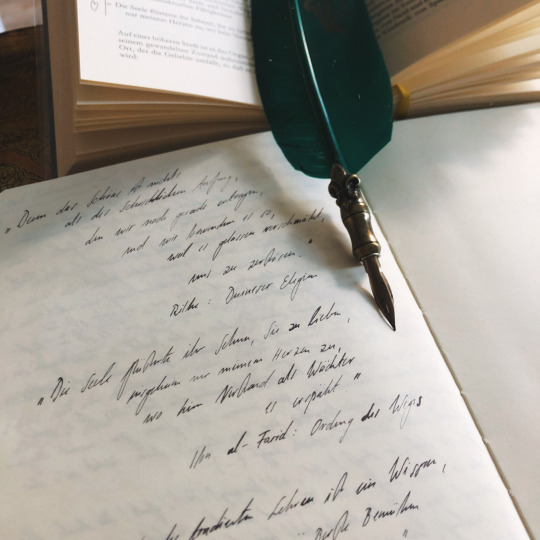
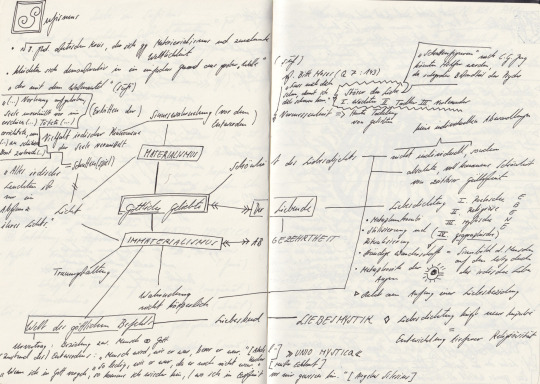
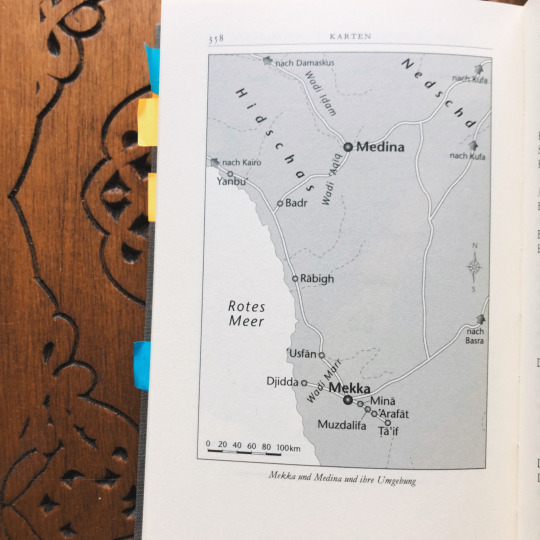
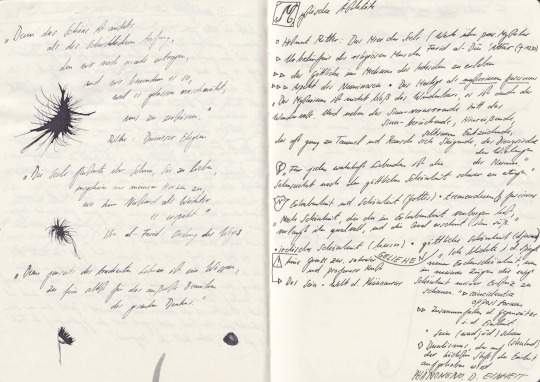
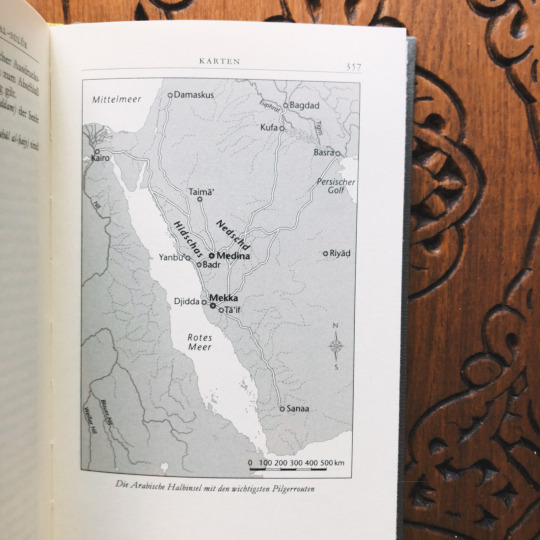
Ibn al-Farid was born in 1181 in Cairo, Egypt, during the Ayyubid period. He was a member of a prominent family and received a classical education in Islamic sciences, literature, and poetry. Ibn al-Farid is regarded as one of the greatest mystical poets in Arabic literature. His work has profoundly influenced subsequent generations of poets and Sufis.
The Diwan of Ibn al-Farid is a collection of his poetry, encompassing his famous qasidas (odes) and other forms of Arabic poetry. This compilation showcases his mastery in both poetic form and spiritual depth and reflects themes of divine love, union with God, and the spiritual journey.
Through translations, his mystical odes were known in the European region, first by Viennese court interpreter and friend of Goethe Josef von Hammer-Purgstall (1774 - 1856): The Arabic Song of Love (1854). 1917 the didactic poem ‘Al-Ta'iyyah al-Kubra’ was translated into Italian by Ignazio Di Matteo, critically analysed by Carlo Alfonso Nallino ‘Poema mistico�� and Alleyne Nicholson's work of 1940 'The Odes of Ibnu 'l-Farid' bulding the basis for this edition by Prof. Renate Jacobi.
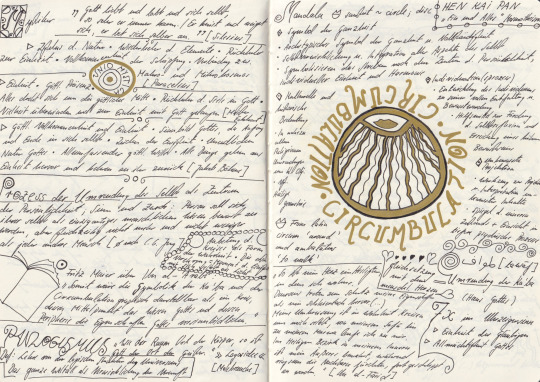
Love poetry - Ideal of love
Individual relationship of lovers above the norms and demands of society
Frequent motif:
Conflict, experienced as tragic in a world of social change, as a hopeless relationship in which the lovers who cling to it perish; Typical of ‘udhritic poetry (Bedouin tribe of the ’Udhra): By no means platonic, but sexual fulfilment only in marriage, which, however, is denied
‘The poet and his beloved have known each other since childhood, fall in love and want to marry, but the woman is married off to a richer man by her parents. The lovers remain faithful to each other. They meet, but without offending decency, and in the end the poet, and sometimes the lover, die of grief.’
‘Poets of the ‘Udhra tribe from the 7th century sang of their passionate love for a single woman who outlasts death. Before that, the concept of ‘udhrite love (al-hubb al-’udhri) was derived, which plays an important role in classical Arabic literature, in poetry and prose, as well as in profane love theory.’
Famous couples:
> Djamil and Buthaina (Djamil ibn Ma'mar, d. 701, is the most important poet of the ‘udhra tribe; his divan is considered relatively reliable) > Kuthaiyir and ‘Azza (Kuthaiyir, d. 723) > Qais and Lubna (Qais ibn al-Dharih, d. 689, like Kuthaiyir belonging to a different tribe, but attributed to the ‘Udhrite school; from the tribe of “Amir, called al-Madjnun ”the madman’ and his lover Laila; Poeticised by many mystical poets in many Islamic literatures + symbol of absolute love of God; doubts about historicity, attributed verses probably do not date from the 7th century either;) Basic structure resembles ‘udhritic poetry, yet deviations:
‘After Madjnun loses Laila, he falls into madness. He turns away from human society and lives among the animals in the desert until his death, focussing entirely on his love for Laila. His renunciation of the outside world is so total that he is unable to turn his attention to the real Laila when she visits him in the desert. His inner image of her holds him completely captive.’ [p. 161]
(The poet's response to his lover's accusation that he does not pay attention to her:)
‘You fill my heart so much that I cannot look at you.’
[Abbas ibn al-Ahnaf, d. 808)
'Udhritic love in two genres: Poetic (ghazal) and narrative form; complement each other and are placed in a historical context in Arabic tradition
+ Narratives initially oral, records were collected in the 8th century

The concept of ‘udhritic love’ reached Heinrich Heine via Henri Stendhal's treatise ‘De l'amour’ (1822):
The wonderful Sultan’s daughter Every day used to rush, Around the evening hour to the fountain, Where the white waters splash. The young slave stood pale At the fountain, around evening,, Where the white waters wail; And his paleness was increasing. One evening the princess approached him With sudden words, like a whip: I want to know your name, Your home and your kinship! And the slave spoke: My name is Mohammed I come from the Yemen that I cherish, And I stem from the tribe of Asra, From those who, when they love, they perish. [Translation by Joseph Masaad]
My (incomplete) notes in German
#literature#book#bookworm#book cover#classic literature#world literature#arabic poetry#arabic culture#sufi#sufism#monism#mysticism#divine love#love#poetry#cultural heritage
2 notes
·
View notes
Text
International Symposium on the "History and Legacy of Muslims in the Caribbean"
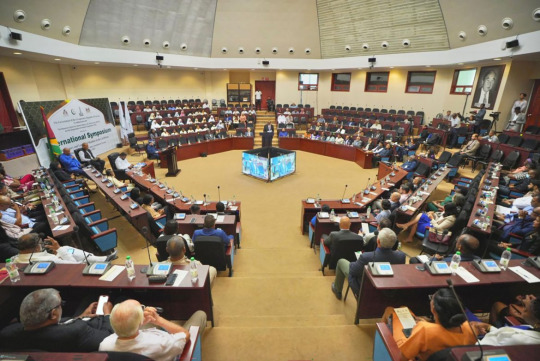
ircica.org
International Symposium on the "History and Legacy of Muslims in the Caribbean"
OIC IRCICA
6–8 minutes
The International Symposium on the “History and Legacy of Muslims in the Caribbean” organized by IRCICA, OIC General Secretariat, the Government of Guyana and Guyana University was opened by President H.E. Mohamed Irfaan Ali with a Feature Address on 4 September 2023. IRCICA Director General Prof. Mahmud Erol Kılıç gave an address at the opening ceremony. Moderated by Mr. Al Creighton, Dean of the Faculty of Humanities and Education of the University of Guyana, the ceremony started with Quran recitation and translation by Hafiz Salih Rahim, and heard the opening remarks of H.E. Mr. Hugh Hilton Todd, Minister of Foreign Affairs and International Cooperation; Dr. Abdullah Hakim Quick, Special Envoy of IRCICA to the Caribbean; Dr. Alhoucine Rhazoui, Director of Cultural Affairs, OIC General Sceretariat, as well as cultural items, consisting of the Islamic Chant in Urdu recited by Mr. Imran Ali, Deputy President of the Muslim Youth Organization, and the Islamic Chant in Yoruba language presented by Mr. Toyib Hamza. A press conference followed the opening session. The ceremony and the working sessions were held at Arthur Chung Conference Center in Georgetown.
Subsequently, the same day, IRCICA Director General Prof. Mahmud Erol Kılıç was received by H.E. President Mohamed Irfaan Ali for a welcoming meeting. Professor Kılıç briefed H.E. the President about IRCICA’s objectives and activities. Mr. Hugh Hilton Todd, Minister of Foreign Affairs and International Cooperation, high officials from Guyana, and the IRCICA delegation members, were also present at the meeting. Director General Prof. Kılıç presented H.E. President Irfaan Ali and Foreign Affairs Minister Mr. Hugh Todd with samples of IRCICA’s publications in the series of studies on the Holy Qur’an.
The working sessions of the symposium, spread over three days, were on the following themes:
First day, Session I: Globalization and Localization in the Caribbean: Aliyah Khan, University of Michigan, | The Qasida and Muslim Devotional Music in Guyana and Trinidad; Frank J. Korom, Boston University | The Current State of Hosay (Moharram) Observances in the Caribbean; Abdin Chande, Adelphi University | Migration and Identity of South Asians of the Caribbean and East African Indian Ocean Region: A Comparative Analysis; Maurits S. Hassankhan, Anton de Kom University of Suriname | Localization and Globalization of Religion: The Case of Hindustani Muslims in Suriname.
Session II: Islam in the Greater Caribbean from Early History to Today: Abdullah Hakim Quick, The Islamic Institute of Toronto | Aspects of Muslim History and Legacy in Pre-Columbian America; Juan Thomas Ordóñez, Universidad del Rosario | Caribbean Lebanon: The Muslim Experience on the Colombia/Venezuela Border; Mohamed A. Hakim, Islamic Educator and Social Activist in Haiti | History of Muslims in Haiti; Nuri Muhammad, Imam, Radio Commentator and Social Activist | The Evolution of Muslim Presence in Belize and the Significance of Garifuna Cultural Retrieval;
Session III: Panel on Black Atlantic Muslim Movements – Remapping and Theorizing Global South Migrations: Youssef Carter, University of North Carolina-Chapel Hill | Western Sunrise in the Global South: The Islamic Party comes to the Caribbean; Tasneem Siddiqui, Drexel University | The Caribbean Is No Island: Rethinking Black Geographies through Muslim Resistance Movements; Nsenga Knight, Artist & Storyteller | Irregular Black Muslims: Diasporic Exchange & The Caribbean Elsewhere.
Second day, Session I: Guyanese Experience: Ateeka Khan, McMaster University | East Indians, Religion, and Politics in 20th Century Guyana; Nazim Baksh, Former Investigative Producer with Canadian Broadcasting Corporation (CBC) | Conflict, Continuity and Change of Religious Narratives and Practices of Muslims in Guyana (1977-1981); Ahmad Hamid, Imam and Researcher | The Challenges and Role of CIOG in the Transformation of the Muslim Community of Guyana from Chaos to Stability; Wazir Baksh, Historian and Community Activist | The Masjid as an Essential Institution to Preserve Faith and Social Cohesion: The Case of Guyana.
Session II: Voices from Trinidad and Tobago: Halima-Sa’adia Kassim, University of the West Indies | An Evaluation of the Resultant Negotiations of Living in an Alien Society: The Indo-Muslims of Trinidad Claiming Their Place; Nasser Mustapha & Mirza Ali Mohammad, University of the West Indies | Race and Ethnic Relations in Trinidad and Tobago; Anand Rampersad, University of the West Indies | Successful Muslim Cricketers in Trinidad and Tobago.
Session III: Economy, Identity and Decolonization in the Caribbean: Ibraheem Musa Tijani, International Islamic University Malaysia | The Economic Development and Commerce of the Muslim Communities in the Caribbean and the Emergence of Islamic Finance in the Region; Stanley L. Soeropawiro, Policy Advisor Religious Affairs, Ministry of Home Affairs (Suriname) | Economic Development among the Javanese Muslims in Suriname; Karimah Rahman, Toronto Metropolitan University | Decolonizing Muslim Indo-Caribbean Mental Health; Suleiman Bulbulia & Sabir Nakhuda, Historians and Authors | The Muslims of Barbados: Sustaining A Muslim Identity.
Third Day, Special Presentation at the University of Guyana by: Abdullah Hakim Quick, Nuri Muhammad, Mohamed A. Hakim and Stanley L. Soeropowero.
The closing ceremony of the symposium was conducted with the remarks of Prof. Dr. Aboubacar Abdullah Senghore, Assistant Director General, IRCICA and Ambassador Elisabeth Harper, Permanent Secretary, Ministry of Foreign Affairs and International Cooperation of Guyana.
On 5 September 2023, IRCICA Director General Prof. Mahmud Erol Kılıç had a meeting with Professor Paloma Mohamed Martin, Vice-Chancellor of the University of Guyana. The meeting was a fruitful occasion to exchange views on research and education in Islamic studies.
During the symposium period, Director General Prof. Mahmud Erol Kılıç held contacts and meetings with Muslim cultural institutions and educational organizations in Guyana including the Central Islamic Organization of Guyana (CIOG), Guyana Islamic Trust and the ISA School.
3 notes
·
View notes
Text
A tradição da reforma
O estabelecimento do Califado de Socoto sob a liderança do Sheik Usmã dã Fodio foi um processo gradual que levou várias décadas para se concretizar. O estágio inicial e um dos mais cruciais desse processo foi o da mobilização. A partir de 1774, quando o Sheik Usmã tinha apenas 20 anos, ele começou a ensinar e pregar ativamente até estabelecer uma jama‘a (congregação) autônoma que foi capaz de começar a afirmar sua independência das autoridades de Gobir em 1804. É dentro da ‘estrutura de mobilização’ do movimento de reforma de Socoto que precisamos localizar o significado da literatura ajami e como ela foi efetivamente explorada pelos líderes califas para estabelecer uma presença substancial nas comunidades rurais e não alfabetizadas de Gobir, Zamfara e Kebbi. ‘Abdullahi dan Fodio (falecido em 1829) foi enfático sobre o papel que a literatura ajami desempenhou nesse processo de mobilização quando escreveu: Então nos levantamos com o Shaikh, ajudando-o em seu trabalho missionário pela religião. Ele viajou com esse propósito para o Oriente e o Ocidente, chamando as pessoas para a religião de Deus por sua pregação e suas qasidas [odes] em Ajami [Hausa e Fulfulde] e destruindo costumes contrários à Lei Muçulmana.
O próprio Sheik Usmã dã Fodio, ao enfatizar a importância estratégica do uso de ajami em seus esforços de mobilização, disse o seguinte em seu poema Fulfulde intitulado Babuwol kire: Nufare nde am yusbango en baabuwol kire Mi yusbira ngol Fulfulde Fulbe fu yeetoye To min njusbiri arabiyya aalimi tan nafi‘ To min njusbiri fulfulde Jaahili Faydoye
Minha intenção é compor um poema sobre a [prostração] do esquecimento Pretendo compô-lo em Fulfulde para que Fulbe possa ser iluminado. Quando compomos [um poema] em árabe, apenas os eruditos se beneficiam. Quando o compomos em Fulfulde, os iletrados também ganham.
O foco do Sheik Usmã dã Fodio e seus tenentes nesta fase do movimento parece ter sido desenvolver uma personalidade muçulmana consciente, capaz de discernir os males sociais de Hausaland e seus problemas e contradições religiosas. Este aparente protesto sociorreligioso encontrou expressão em vários poemas ajami, particularmente aqueles de autoria do Sheik Usmã dã Fodio. Um poema que tem desfrutado de alguma popularidade nesta categoria é o Fulfulde urjuza do Sheik Usmã, chamado Boneji Hausa (Doenças da Hausalândia). Este poema admite os muitos males prevalentes na sociedade Hausa e a conspiração do silêncio por líderes do pensamento que tornou difícil abordá-los de qualquer maneira séria e sistemática. O poema prossegue destacando alguns desses males: Goddi boneji mairi bo, bukkaki Goddi boneji mairi bo, simaki Goddi boneji maari bo, diccaki A hinnata goodo e-dou nguski Goddi boneji mari bo juldo nanngoya Na yo jeyado, jaggineki tokkoye Goddi boneji maari shar’u doggata E mairi jul yimbe mairi ndonnata Goddi boneji mairi jula nanngata Zakka mo mashiyaji bo be ittata Goddi boneji mairi reube njangata Balli di mabbe bo kurum be cuddata Wodbe benteje fede sabal sabal Hayya e be yimbe ngala e dou datal. Alguns males são tatuagens nos rostos Outros são choros pelos mortos. Alguns males são as saudações feitas ‘Não saudarás em pé’ Alguns de seus males são a captura de um muçulmano livre, não de um escravo. Esta ação é então seguida pela escravidão. De seus males está o fato de que a shari‘a não prevalece. E muitas de suas pessoas não distribuem propriedades de acordo com a Lei. Um de seus males é realizar orações sem ablução. O zakat de seus animais eles nunca pagam. Outro mal é que as mulheres não aprendem Seus corpos elas nunca cobrem adequadamente Alguns deles têm seus aventais ‘bante’ soprando frouxamente ‘Sabal Sabal’. Oh! Essas pessoas não estão no caminho certo.
Outro poema do Sheik Usmã que se enquadra nessa categoria é Wasuyeji (Conselho), que desencorajava a interação social com governantes opressores, inovadores e outros personagens indesejáveis e encorajava manter a companhia dos piedosos, dos eruditos e seguidores da Sunna, pois estes últimos, de acordo com o sheik, eram superiores tanto ao pai quanto à mãe. O poema Fulfulde do Sheik Usmã, Hasotobe, elaborou ainda mais sobre um grupo desses personagens indesejáveis, os espalhadores de boatos e os espalhadores de ódio que não viam nada de bom no que o sheik e seus discípulos estavam tentando realizar.
The Meanings of Timbuktu - Souleymane Bachir Diagne
#islam#ajami#áfrica#traducao-en-pt#cctranslations#meaningsoftimbuktu-sbd#califado de socoto#califados#sheik usma da fodio#hauçá#we are so back lets bleepin go#back to posting regurlarly ay
0 notes
Text
Arabic poetry holds a cherished place in the cultural tapestry, captivating hearts for centuries. It encompasses diverse forms like qasidas, muwashshahs, and ghazals, each offering a unique artistic expression.
Qasidas, known for their celebratory nature, honor individuals and events with eloquent verses. Muwashshahs, with their intricate rhyme schemes and vivid imagery, transport readers to enchanting realms. Ghazals, the beloved love poems originating from the 8th century, evoke profound emotions.
These poetic treasures continue to resonate worldwide, transcending borders and inspiring poets across cultures. Modern poets embrace new styles like free verse and spoken word, blending tradition with contemporary creativity.
Embark on a journey through the magical world of Arabic poetry, where words dance on the page and emotions find solace in the lines.

0 notes
Video
youtube
Sir De Ky Rab Nu Manaya Ae Hussain Ne |Qasida 2024 | Manqabat Imam Hussa...
0 notes
Text
What Are Xassidas (Qasidas)?
Qasidas are praise songs or poems, like the ones created by grand marabouts (founders and or leaders of the brotherhoods) in praise of the final prophet in Islam, Prophet Mohammed (Dilley, 2011). The practice of creating or reciting Qasidas is seen as essential as the belief is held that the creators of these Qasidas were connected to, and connected them to, the Almighty as the “Prophet Mohammed was so swayed by the praise and devotion contained within the songs” (Dilley, 2011). Those in these brotherhoods believe they are showered with ‘baraka’ or gods blessing whenever they recite these qasidas as they view the founders as the original spiritual guides (Dilley, 2011).
Dilley, R. (2011). “Daaira”, Devotional Acts, and the Transformation of Space in Senegal, West Africa. Anthropos, 106(1), 185–192. https://doi.org/10.5771/0257-9774-2011-1-185 Órgiva, K. [Kutubía Órgiva]. (2021, March 14). Qasida Diawartou of Sheikh Ahmadou Bamba [Video]. Youtube. https://www.youtube.com/watch?v=26iKgxyntLE&t=64s
youtube
0 notes
Text
An Encounter with Poetic Brilliance

An Encounter with Poetic Brilliance
Wasef Bakhtari's Introduction to Qahar Asi's collection of poems "Alone, Yet Everlasting"
Translated from the Farsi by Farhad Azad
AftaabMag.com | Spring 2024
This is Wasef Bakhtari's (1943-2023) introduction passage to Qahar Asi's collection of poems "Alone, Yet Everlasting" تنها ولی همیشه.
- - -
An Encounter with Poetic Brilliance
The thirteen years that have passed deserve scrutiny from various perspectives, including the viewpoint of poetry, this inseparable fellow of nations. We had thought or perhaps even persuaded ourselves that the era of arbitrary compliance and the reign of tyrants was over. Yet, we saw what happened in our poetry with open eyes but closed memories.
There was a time when Mahmud of Ghazni would urge his court poets to pen odes, for instance, about the conquest of Somnath. Alas, this tradition of panegyric poetry continued into our time, with the difference that the poems of Unsuri, Farrukhi, and Asjadi were masterful, intricate, and radiant like Mahmud's crown. However, the products of the flattering pens of our time's poets are unsightly and decaying, like a beggar's bowl.
But don't think that our poetry was entirely like this. There were also pioneers of liberty in these years who refused to let the unpurified enter the hallowed temple of poetry and wreak havoc in this realm.
And amid these years, Qahar Asi, with his rebellious soul and rural pride, set foot in the arena of our ear's poetry. In my opinion, his advancement in this area was a momentous event.
Asi began his poetic journey by composing two couplets: a song for lovers' souls and one for farmers and shepherds. Then, he adopted the forms of rubaiyat and ghazal, drawing from the ever-abundant harvest of the rebellious drinkers of the bitter draught of pain and burners of the sweet flame of serenity poets of Nishapur and Shiraz.
–Wasef Bakhtari, Kabul, 1991
- - -
Reflections on "An Encounter with Poetic Brilliance"
By Farhad Azad
Critique of Regime
The phrases "blind obedience," "reign of oppressors," and the reference to poetry's fate align with the political climate and cultural restrictions imposed by the communist regime that came to power after the coup of April 1978. Here, Bakhtari aims at the regime that promised to dismantle Daoud's one-party system in the name of equality, merely perpetuating the cycle of dogmatic indoctrination.
Striking is the surprising openness of the work, written and published in 1991 by the Ministry of Information and Culture printing press in Kabul. The regime's belated attempts at self-reform after thirteen years of experimentation proved futile; within a year, it would collapse, and the Islamists would ascend to power under UN auspices.
Panegyric Poetry
Panegyric poetry is a formal style that extravagantly praises its subject, often using exaggerated language and vivid imagery. While potentially seen as overly flattering, it provides valuable historical and cultural insights into the values and aspirations of different societies.
Panegyric Poetry in the Court of Mahmud of Ghazni
The famous scholar and historian al-Biruni (973-1048) documented Mahmud of Ghazni's (r. 998-1030) destruction of the Somnath temple in Gujarat, India, a sacred site for Hindus. Mahmud of Ghazni, known for maintaining a court of poets, commissioned works from them, including verses in his praise, such as panegyric poetry.
Unsuri, Farrukhi, and Asjadi were prominent Farsi poets who lived during the Ghaznavid era (late 10th to early 11th centuries). They were part of the court of Sultan Mahmud of Ghazni, a powerful ruler who patronized arts and literature.
Unsuri Balkhi: He was considered the poet laureate of Mahmud's court and is known for his panegyric qasidas (odes) praising the sultan and his military exploits. His poetry is characterized by its ornate language, elaborate metaphors, and hyperbolic praise.
Farrukhi Sistani: He was another celebrated poet of the Ghaznavid court, known for his vivid descriptions, elegant style, and mastery of various poetic forms. His qasidas often depict battles, landscapes, and courtly life with a keen eye for detail.
Asjadi was a younger contemporary of Unsuri and Farrukhi, who was also associated with the Ghaznavid court. His poetry is admired for its emotional depth, philosophical reflections, and lyrical beauty. He wrote in various genres, including qasidas, ghazals (lyric poems), and rubaiyat (quatrains).
These poets played a crucial role in establishing the panegyric tradition in Farsi poetry, which became a dominant genre in subsequent centuries. Their works provide valuable insights into the Ghaznavid era's history, culture, and literary landscape.
A panegyric verse by Unsuri:
شاه حبش است زلفت ای بدر منیر
از عنبر تاج دارد از لاله سریر
تو شسته همی کنی گل سرخ بقیر
من شسته همی کنم بخوناب زریر
Your locks are the king of Abyssinia, oh radiant moon
With a crown of ambergris and a throne of tulips
You wash the red rose with musk
As I wash my armor with the blood of Zariir
Zariir is a heroic warrior in the Shahnamah. This Unsuri verse, likely praising Sultan Mahmud of Ghazni, contrasts the beloved's opulence with the poet's harsh warrior life, subtly elevating the ruler as a source of beauty and peace while depicting the poet and warriors as loyal, self-sacrificing servants.��

Caption: A 19th-century Qajar-era painting depicts poets Asjadi (seated right) and Unsuri (seated left), alongside the revered Ferdowsi, in the court of Mahmud of Ghazni. Tales of the Ghaznavid court and its illustrious coterie of poets continue to resonate through the ages. Poetry of the "Rend" Creed
In this brief introduction, Bakhtari offers a wealth of insight, juxtaposing the literary traditions of the past with the realities of the present. Bakhtari highlights two poetic corners steeped in the "rend" philosophy. While these poets might not have explicitly embraced the label "drinkers of pain, burners of comfort," their work often echoed this sentiment, challenging conventional happiness and seeking meaning in life's struggles.
Praise for Asi's Work
Bakhtari generously homages Asi, who, over the past decade, has evolved into a mature poet and candid voice for the quotidian struggles of his compatriots in Kabul and the countryside.
Asi's Hopes and End
Asi eagerly anticipated the war's end and wrote verses championing the opposition against the USSR occupation, only to be bitterly disappointed when the Islamists lay waste to his beloved city.
In the aftermath of Kabul’s destruction, he wrote his final work, From the Island of Blood: Elegies for Kabul, published in Kabul in January 1993— by the fall of 1994, a rocket fired by an Islamist faction killed Asi in Kabul.
1 note
·
View note